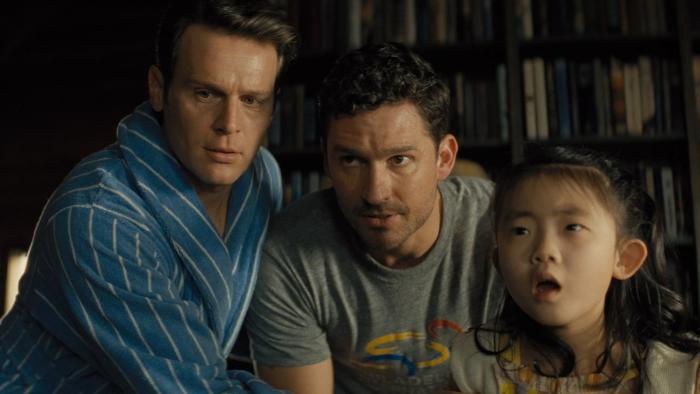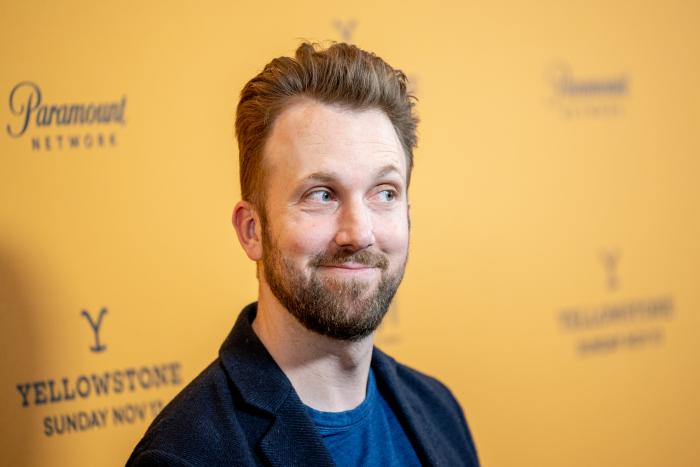

Paul Tremblay Preferred His Ending to Shyamalan's in 'Knock at the Cabin'
By Dustin Rowles | Film | February 8, 2023 |
By Dustin Rowles | Film | February 8, 2023 |

Full Disclosure: I like Paul Tremblay’s novels, I liked but did not love The Cabin at the End of the World, and I really liked M. Night Shyamalan’s adaptation of it, Knock at the Cabin. There are a number of differences between Tremblay’s novel and Shyamalan’s movie, both big and small, but the biggest change was in the ending. Ironically, I preferred the movie’s ending because it wasn’t as bleak, while Tremblay preferred his own ending because, in his opinion, his ending wasn’t as dark.
For those who want to see the film — you should! — or read the novel, avoid the rest of the post. Spoilers for the film and the novel.
Both the film and the novel take place in a cabin in the middle of the woods, where four people strangers pay a visit to a gay couple, Andrew (Ben Aldridge) and Eric (Jonathan Groff), and their 7-year-old daughter, Wen (Kristen Cui). The strangers, the leader of whom is Leonard, played by Dave Bautista in the film, tell them that they have to sacrifice one of their own or else the world will end in a series of plagues and they’ll be left alone to wander the planet. The strangers give them several opportunities to make a sacrifice, and after Andrew and Eric reject each opportunity, the strangers brutally kill one of their own.
Meanwhile, some real bad sh*t is happening out in the real world: A pandemic, an unexpected tsunami, and planes falling out of the sky. In both the film and the book, the strangers claim that these events are the consequences of Andrew and Eric’s failure to make a decision about who to sacrifice. In the book, it is unclear if the calamities occurring in the real world (and seen in news reports) are actually related to Andrew and Eric’s refusal to make a sacrifice or are just coincidences; in the movie, the calamities are more directly linked to the failure to sacrifice.
At the end of the film, Eric — so that Wen can grow into an adult with Andrew — insists that Andrew kill him to put a stop to the apocalypse. He does so, Wen and Andrew survive, and the end of the world does not arrive. In the book, Wen (the adorable 7-year-old) is accidentally killed, but because the choice to make a sacrifice must be intentional, Wen’s death does not stop the supposed apocalypse. Andrew and Eric still must make a sacrifice. Instead of sacrificing one another, Andrew and Eric decide not to, and the novel ends with the fate of the world left an open question.
Tremblay believed his ending was the more hopeful one. I disagree, but I understand why he believes that, as he explains to the Los Angeles Times:
When I wrote it, I tried to divorce myself from thinking about if there was an apocalypse or not. I purposely tried to keep each piece of information balanced. And at a certain point in telling the story it didn’t matter to me if the apocalypse was happening because the story to me became, “What were Eric and Andrew going to choose?”That was the story: their choice. Their ultimate rejection of fear and cruelty, whether or not the apocalypse is happening. What has happened in the cabin and what they’re presented with is wrong; it’s immoral, and they refuse. And I find that hopeful, especially in the context of when I wrote the book.
Tremblay also noted that a lot of people were pissed off about the ambiguous ending. I didn’t hate it, but I think that — as a parent — any ending in which the child dies is a bad one. Whether there was actually an apocalypse in the novel or not wouldn’t matter to me. Once Wen died, all hope is lost.
I think the movie’s ending is way darker than my book. I don’t mean to say this flippantly. But politics aside, on a character level, the idea of, “What are Andrew and Wen going to do now?” Not only did they just kill Eric — how will they go on after with that knowledge? — but also with the knowledge that this supreme being that controls the universe was so unremittingly cruel to them? I would never write a sequel to “The Cabin at the End of the World,” but I’m actually weirdly interested in a story of what Wen and Andrew do now.
This is such an interesting perspective because, for me, there’s no question. Once it is established that the impending apocalypse is real, one of the parents is going to sacrifice our self so that the other can live out the rest of their life with the kid. If I didn’t know whether the apocalypse was real or not, it wouldn’t matter. My only child is dead and things are pretty bleak, but if I could save the world for the rest of humanity by sacrificing myself? I’d opt to do that rather than stubbornly refuse out of some sort of misguided belief that simultaneous planes falling from the sky, a pandemic, and a tsunami were not religious in nature. I’m not a religious person, but come on! I don’t need frogs to fall from the sky to get the hint.
This really goes to the same question posed by The Eternals. Any mathematical calculation or cost/benefit analysis would result in the same thing: One of the parents sacrificing themselves. Maybe that calculation, however, is different if you are a hardcore atheist.
As for what Andrew and Wen will do now? They’re going to live their life in a way that best honors Eric, of course. The sequel would be boring.
Source: Los Angeles Times
← A Realistic History of the Wizarding Schools In the Harry Potter Universe | 5 Shows After Dark: 'Kung Fu' Third Season Winter Premiere, 'Abbott Elementary' on ABC →
More Like This
David Dastmalchian's 'Late Night with the Devil' Takes the Late-Night Wars into the Horror Genre
The Stormy Daniels' Doc 'Stormy' Is Big on Attitude but Light on Revelations
The 'Alien: Romulus' Teaser Will Get Your Blood Pumping
A Classic Film That Scarred You As A Child Is Getting A Reboot
Review: 'Damsel' Needs Saving from the Soulless Netflix Formula

Jordan Klepper Got A "Glimmer Of Hope" From A Trump Supporter
Leave Josh Peck Alone, Says Drake Bell in the Wake of 'Quiet on the Set' Revelations
Sophie Turner Has ‘Reactivated’ Her Divorce From Joe Jonas
Is Aaron Taylor-Johnson The Next James Bond?
Sydney Sweeney Is All Business When It Comes to ‘Madame Web’: ‘That Film Was a Building Block’
Megan Fox Helpfully Lists All The Plastic Surgery She's Had
More Like This
David Dastmalchian's 'Late Night with the Devil' Takes the Late-Night Wars into the Horror Genre
The Stormy Daniels' Doc 'Stormy' Is Big on Attitude but Light on Revelations
The 'Alien: Romulus' Teaser Will Get Your Blood Pumping
A Classic Film That Scarred You As A Child Is Getting A Reboot
Review: 'Damsel' Needs Saving from the Soulless Netflix Formula
Reviews